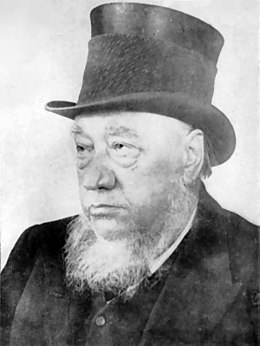
Paul Kruger was the fifth and last president of the South African Republic (1883-1902). Today, 10 October, is celebrated among the Boer people as Kruger Day, the date of his birth on which they remember their greatest leader.
Kruger was born in 1825, with his family joining the Great Trek to inland South Africa when he was just a little over 10 years old. Kruger shortly thereafter, as a young teenager, was involved in his first battle against a black tribe, and in the years thereafter he rose to fame as a successful military leader. At the age of 16 he was farming his own land in what was then still the wholly untamed Transvaal. In 1852, at the tender age of 27, he represented his people at the Sand River Convention, where the British formally recognized the independence of the South African Boer Republic. In the constitution of the Republic which he helped draw up, one of the conditions for citizenship was that one was a member of a Reformed Church in good standing. Kruger was committed to the idea of a Calvinist Boer state.
He was a founding member of the Reformed Church in 1859, which the Voortrekker Boers founded after being excommunicated by the Church in the Cape for participating in the Great Trek, which it condemned as rebellion against the British crown. This new church was conservative and strongly orthodox Calvinist. It was condemned by opponents as “doppers”, derived from the Dutch word for “damper”, because of their conservative convictions.
Under Kruger’s influence these orthodox Calvinists took the lead in the nationalist revival of the late 1870s in the South African republic.1 Kruger opposed the liberal policies of his predecessor, President Burgers, who was so unpopular with his own people that when the British marched into Pretoria and annexed the republic in 1877, not a single Boer commando responded to Burgers’s call for resistance.
At a national convention at Paardekraal in December 1880, the Boer people recommitted themselves to keeping the vow made at Blood River, restored their national independence, and shortly thereafter elected Kruger as president. Discussions between Kruger and Queen Victoria aimed at resolving the South African Republic’s national issue led to nothing. In 1881, sadly, the first Anglo-Boer war broke out, but the Boers under Kruger’s leadership were victorious.
Kruger was the first Boer president to acknowledge God’s grace in miraculously saving the Boers from the black tribes and British Empire whom they constantly fought. However, his Christian government was tainted by the constitutional amendment incorporating “religious freedom” in the South African republic shortly after the victorious first Anglo-Boer war in 1881.2 As president, Kruger issued a proclamation granting one acre of land to every congregation who desired to build a church. Sadly, he also granted land for the building of a Jewish synagogue, although he gave them only half an acre because “they only believe half the Bible.”
Kruger’s Boer nation would be defeated at the hands of the British in the second Anglo-Boer war (1899-1902), a defeat that must certainly be viewed as God’s judgment for instituting religious pluralism, and that only a couple of years after recommitting the nation to God.
During the war, Kruger traveled to Europe to garner sympathy and support for the Boer cause. He eventually died in Switzerland in 1904, at the age of 79.
He is remembered throughout the world as a God-fearing statesman who led his people on the paths of justice. His legacy stretched far and wide. During the Second World War, Germany made a nationalist film, Ohm Kruger, about this great Boer leader. A friend of mine once visited with a Presbyterian family in the South who had in their house a portrait of Kruger, remembering him as one of the greatest Calvinist leaders.
While his reign was not untarnished by sin, he certainly steered the Boer people away from the nineteenth-century Enlightenment liberalism that had threatened their national existence at the time, and towards re-commitment to the covenantal Calvinism of their ancestors. In this sense he should certainly be revered as one of the nineteenth century’s greatest statesmen.
Footnotes
- Van Zyl, M.C. Die Protesbeweging van die Transvaalse Afrikaners (1877-1880). Academica: Pretoria, 1979, p. 29 ↩
- http://praag.co.za/?p=6121 – note: the article is in Afrikaans ↩
| Tweet |
|
|
|




